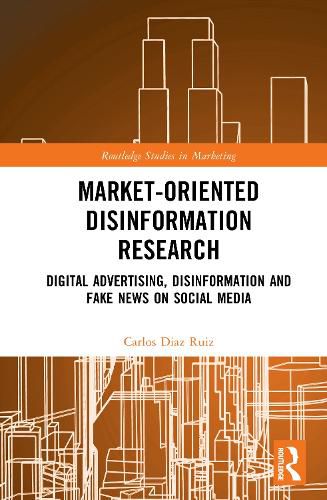Readings Newsletter
Become a Readings Member to make your shopping experience even easier.
Sign in or sign up for free!
You’re not far away from qualifying for FREE standard shipping within Australia
You’ve qualified for FREE standard shipping within Australia
The cart is loading…






Market-Oriented Disinformation Research explores the spread of false or misleading information online through the lens of marketing theory and consumer research. It examines how the business models of digital platforms and advertising technology firms (AdTech) generate digital markets that incentivize the circulation of harmful content for profit. Rather than viewing disinformation and misinformation as accidental byproducts, the book proposes that they thrive in the current markets designed for digital advertising and influencer marketing.
Readers will learn how the amplification of disinformation can be linked to social media's business model. Examples include how social media algorithms promote addictive content, how fake news sites use ad fraud to lure in advertising revenue, and how some content creators rely on clickbait, ragebait, bots, and conspiracy theories to boost their engagement metrics.
The book is a must-read for scholars in journalism, media studies, and political communication, as well as policymakers interested in the democratic governance of social media platforms. In addition, it calls for digital marketing, advertising, and brand management professionals to take responsibility for their ad spending by advocating for greater oversight over AdTech intermediaries to prevent unethical actors from monetizing the harmful content that polarizes society and undermines democratic institutions.
$9.00 standard shipping within Australia
FREE standard shipping within Australia for orders over $100.00
Express & International shipping calculated at checkout
Market-Oriented Disinformation Research explores the spread of false or misleading information online through the lens of marketing theory and consumer research. It examines how the business models of digital platforms and advertising technology firms (AdTech) generate digital markets that incentivize the circulation of harmful content for profit. Rather than viewing disinformation and misinformation as accidental byproducts, the book proposes that they thrive in the current markets designed for digital advertising and influencer marketing.
Readers will learn how the amplification of disinformation can be linked to social media's business model. Examples include how social media algorithms promote addictive content, how fake news sites use ad fraud to lure in advertising revenue, and how some content creators rely on clickbait, ragebait, bots, and conspiracy theories to boost their engagement metrics.
The book is a must-read for scholars in journalism, media studies, and political communication, as well as policymakers interested in the democratic governance of social media platforms. In addition, it calls for digital marketing, advertising, and brand management professionals to take responsibility for their ad spending by advocating for greater oversight over AdTech intermediaries to prevent unethical actors from monetizing the harmful content that polarizes society and undermines democratic institutions.